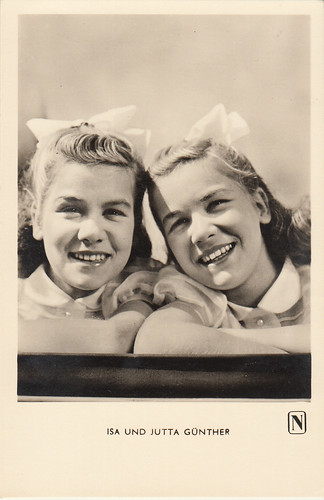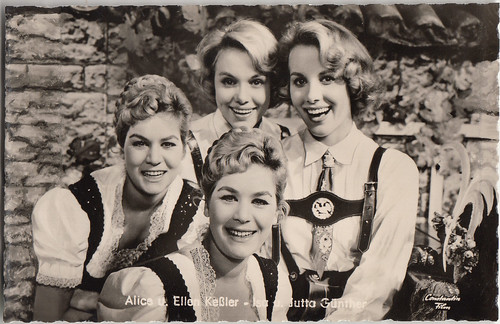German twin sisters Isa and Jutta Günther (1938) are former child actresses. In 1950 they were a huge success in the Erich Kästner adaptation Das Doppelte Lottchen/Two Times Lotte. Several more light entertainment films with the twins followed during the 1950s.

German postcard by Rüdel-Verlag, Hamburg-Bergedorf, no. 533. Photo: Carlton / Film National. Publicity still for Das Doppelte Lottchen/Two Times Lotte (Josef von Baky, 1950).

German postcard by Ufa, Berlin-Tempelhof, no. CK-88. Retail price: 30 Pfg. Photo: NF-Film.
Isa and Jutta Günther were born in Munich in 1938.
They began their film careers in 1950 in Das Doppelte Lottchen/Two Times Lotte (Josef von Baky, 1950), based on the popular children's book by Erich Kästner. The story revolves around two girls who find out that they are separated twins, and decide to change identities, to reunite their divorced parents (portrayed by Antje Weissgerber and Peter Mosbacher).
D.B. du Monteil at IMDb: "This is the kind of stuff which might seem maudlin, but Joseph Von Baky's treatment is pleasant, nay even interesting: the dream scenes are the best as if the scenarists had read Bruno Bettelheim (whose book about fairy tales was yet to come)."
The film was a blockbuster and led to several German family films with the twin sisters. The comedy Ich und meine Frau/I and My Wife (Eduard von Borsody, 1953) featured Attila Hörbiger and his wife Paula Wessely and the twins played their daughters.
The girls became teenagers and in the comedy Der erste Kuß/The First Kiss (Erik Ode, 1954) they enjoyed their first kiss. Most of these Heimat comedies are now justly forgotten.

German postcard. Photo: Union Film.

German postcard by Kunst und Bild, Berlin, no. A 104. Photo: N. Collection: Marlene Pilaete.

German postcard by Kolibri-Verlag, Minden/Westf., no. 1156. Photo: Melodie Donau-Film / Herzog-Film / Malek. Publicity still for Der erste Kuß/The First Kiss (Erik Ode, 1954).
Furthermore, the Günther twins had guest roles in Schlager films like An jedem Finger zehn/Ten On Every Finger (Erik Ode, 1954) starring Germaine Damar, and Liebe, Sommer und Musik/Love, Summer and Music (Hubert Marischka, 1956).
Without her twin sister, Isa Günther played in two other films. In both the Johanna Spyri adaptation Heidi (Luigi Comencini, 1952) and the sequel Heidi und Peter/Heidi and Peter (Franz Schnyder, 1955), she portrayed Klara Sesemann, Heidi’s rich and ill girlfriend.
In Vier Mädels aus der Wachau/Four Girls from the Wachau (Franz Antel, 1957), the twin sisters appeared together with those other famous twins of the Adenauer era, Alice and Ellen Kessler. Jan Onderwater writes at IMDb: "The twins do not match as in their late teens the Günthers are dull ladies without any spark, while the Kesslers are fresh and jolly as ever. Alas, the Kesslers are hardly given anything to do that is within their (song and dance) line. Together they have a theme song that is sung until not only the twins are tired from it, but the viewer also."
A year later, both Isa and Jutta Günther ended their film careers. At the age of 20 years, they retired from show business and later both married. Isa is now called Isa Günther Wimmer and lives in Köln (Cologne). Jutta’s current name is Jutta Günther-Westerbarkey and she lives in München (Munich).
Their first and most successful film, Das Doppelte Lottchen/Two Times Lotte, was remade several times, including by Disney as The Parent Trap (1961, David Swift) starring Hayley Mills, but according to several IMDb reviewers, the original German version is still the best.

German postcard by WS-Druck, Wanne-Eickel, no. F 33. Photo: Ringpress.

German postcard by Kolibri, no. 2763. Photo: Constantin Film. Alice and Ellen Kessler, Isa Günther and Jutta Günther. The two Germany’s most famous pairs of twins of their time co-starred in one film, Vier Mädels aus der Wachau/Four Girls from the Wachau (Franz Antel, 1957). Collection: Marlene Pilaete.

German postcard by Kolibri-Verlag, Minden/Westf., no. 2023. Photo: Neubach / Constantin / Bokelberg. Publicity still for Die Fischerin vom Bodensee/The Fisher-girl from Lake Bodensee (Harald Reinl, 1956).
Sources: Stephanie D’heil (Steffi-line) (German), Wikipedia (German) and IMDb.
This post was last updated on 21 July 2024.

German postcard by Rüdel-Verlag, Hamburg-Bergedorf, no. 533. Photo: Carlton / Film National. Publicity still for Das Doppelte Lottchen/Two Times Lotte (Josef von Baky, 1950).

German postcard by Ufa, Berlin-Tempelhof, no. CK-88. Retail price: 30 Pfg. Photo: NF-Film.
Blockbuster
Isa and Jutta Günther were born in Munich in 1938.
They began their film careers in 1950 in Das Doppelte Lottchen/Two Times Lotte (Josef von Baky, 1950), based on the popular children's book by Erich Kästner. The story revolves around two girls who find out that they are separated twins, and decide to change identities, to reunite their divorced parents (portrayed by Antje Weissgerber and Peter Mosbacher).
D.B. du Monteil at IMDb: "This is the kind of stuff which might seem maudlin, but Joseph Von Baky's treatment is pleasant, nay even interesting: the dream scenes are the best as if the scenarists had read Bruno Bettelheim (whose book about fairy tales was yet to come)."
The film was a blockbuster and led to several German family films with the twin sisters. The comedy Ich und meine Frau/I and My Wife (Eduard von Borsody, 1953) featured Attila Hörbiger and his wife Paula Wessely and the twins played their daughters.
The girls became teenagers and in the comedy Der erste Kuß/The First Kiss (Erik Ode, 1954) they enjoyed their first kiss. Most of these Heimat comedies are now justly forgotten.

German postcard. Photo: Union Film.

German postcard by Kunst und Bild, Berlin, no. A 104. Photo: N. Collection: Marlene Pilaete.

German postcard by Kolibri-Verlag, Minden/Westf., no. 1156. Photo: Melodie Donau-Film / Herzog-Film / Malek. Publicity still for Der erste Kuß/The First Kiss (Erik Ode, 1954).
Dull ladies without any spark
Furthermore, the Günther twins had guest roles in Schlager films like An jedem Finger zehn/Ten On Every Finger (Erik Ode, 1954) starring Germaine Damar, and Liebe, Sommer und Musik/Love, Summer and Music (Hubert Marischka, 1956).
Without her twin sister, Isa Günther played in two other films. In both the Johanna Spyri adaptation Heidi (Luigi Comencini, 1952) and the sequel Heidi und Peter/Heidi and Peter (Franz Schnyder, 1955), she portrayed Klara Sesemann, Heidi’s rich and ill girlfriend.
In Vier Mädels aus der Wachau/Four Girls from the Wachau (Franz Antel, 1957), the twin sisters appeared together with those other famous twins of the Adenauer era, Alice and Ellen Kessler. Jan Onderwater writes at IMDb: "The twins do not match as in their late teens the Günthers are dull ladies without any spark, while the Kesslers are fresh and jolly as ever. Alas, the Kesslers are hardly given anything to do that is within their (song and dance) line. Together they have a theme song that is sung until not only the twins are tired from it, but the viewer also."
A year later, both Isa and Jutta Günther ended their film careers. At the age of 20 years, they retired from show business and later both married. Isa is now called Isa Günther Wimmer and lives in Köln (Cologne). Jutta’s current name is Jutta Günther-Westerbarkey and she lives in München (Munich).
Their first and most successful film, Das Doppelte Lottchen/Two Times Lotte, was remade several times, including by Disney as The Parent Trap (1961, David Swift) starring Hayley Mills, but according to several IMDb reviewers, the original German version is still the best.

German postcard by WS-Druck, Wanne-Eickel, no. F 33. Photo: Ringpress.

German postcard by Kolibri, no. 2763. Photo: Constantin Film. Alice and Ellen Kessler, Isa Günther and Jutta Günther. The two Germany’s most famous pairs of twins of their time co-starred in one film, Vier Mädels aus der Wachau/Four Girls from the Wachau (Franz Antel, 1957). Collection: Marlene Pilaete.

German postcard by Kolibri-Verlag, Minden/Westf., no. 2023. Photo: Neubach / Constantin / Bokelberg. Publicity still for Die Fischerin vom Bodensee/The Fisher-girl from Lake Bodensee (Harald Reinl, 1956).
Sources: Stephanie D’heil (Steffi-line) (German), Wikipedia (German) and IMDb.
This post was last updated on 21 July 2024.
No comments:
Post a Comment